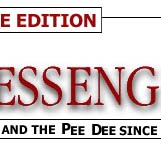|
|
|
Pee Dee Land Trust acquires
its first conservation easement
By
Jim Faile
Managing Editor
August 15, 2001
A 13-acre tract of wilderness that lies along Ten Mile Creek in the Kelleytown area of Darlington County will remain protected as a nature preserve and wildlife habitat thanks to the generosity of a well-known Hartsville family.
 |
| JIM FAILE |
| Jacqueline J. Segars, left, watches as her daughter, Katharine Kelly Segars, signs the agreement granting a conservation easement to the Pee Dee Land Trust. Also looking on are Ann Williamson of the Pee Dee Land Trust and Leigh Edwards of the Palmetto Conservation Foundation in Columbia. |
Jacqueline J. Segars and her daughters Katharine Kelly Segars and Jacquelyn Segars Watford granted a conservation easement to the Pee Dee Land Trust during a brief signing ceremony Wednesday.
The conservation easement is the first for the fledgling Pee Dee Land Trust. Land trusts are local, regional, statewide or national private non-profit organizations set up to conserve important lands for public benefit. They work with landowners to accept donations of property, buying property or helping establish legal restrictions such as conservation easements.
Ann Williamson of Darlington, one of three Darlington County members on the Pee Dee Land Trust's board of directors, said she hopes the Segars' donation will prompt other property owners interested in seeing their property protected for conservation purposes to do likewise.
"This is a happy occasion for the Pee Dee Land Trust," she said.
"My daughters and I are delighted that we can do this and give this piece of property to the Pee Dee Land Trust," said Jacqueline Segars. "It makes us feel good about the land. I do hope a lot of people follow suit."
The land trust includes Darlington, Chesterfield, Marlboro, Dillon and Marion counties. Other board members from Darlington County are Kent Segars of Hartsville and Robert Pitts of Lydia.
A conservation easement is a legal agreement between a landowner and the Land Trust that restricts the use of the property in order to protect its conservation value. The landowner keeps the ownership and use of the land, but donates or sells certain property rights to the trust. Public access to the land is not required.
"Ownership of private property and property rights are not universal, but it's one of the rights that's most important to us," said Ben Williamson of Darlington, who discussed the easement and what it means for conservation efforts in the area.
Williamson congratulated the Segars family for their decision to grant the conservation and thanked them on behalf of the land trust.
"The right to own land is usually thought of as just a right, but it's a very complicated right," Williamson said. "What they're doing today is divesting themselves of some of those rights."
Among the rights granted to the Pee Dee Land Trust under the conservation easement are the right to preserve and protect the property. "That becomes the Pee Dee Land Trust's right and responsibility to protect that land against any destruction of its forests, scenic beauty and wildlife habitat," Williamson said.
While the family still retains ownership of the land, all development rights, including the right to subdivide the property, are turned over to the land trust, which in turn will extinguish those rights in order to protect the land from any future development, William-son said. "That right is gone now by agreement," he said.
The land trust, he said, has pledged not to develop the property and not to let anyone else develop it. The conservation easement makes it illegal for anyone to use the land for any type of development purposes, whether they be residential, commercial or industrial, Williamson said.
"The Segars have given the people of South Carolina, the Kelleytown township, and Darlington County, they have given them those rights, and they are now extinguished," he said. "We, the citizens, have acquired, at very small cost, 13 acres of land that will be preserved in its natural state."
The Segars family retains the right to control who has access to the land. The family can still use the land to grow and sell timber, raise livestock, and for recreational uses such as hunting and fishing. "What they can't do is destroy the conservation value of the land," Williamson said. "They can't destroy the scenic value of the land. They can't destroy the wildlife habitat."
Should the family ever sell the land, Williamson said, only those rights retained by the family under the conservation easement will be transferred to the new owner. The land trust will keep the development and other rights granted to it through the agreement, he said.
Land trusts work to conserve lands with natural, historic or recreational value. Once a landowner has entered into a conservation program with a land trust, the trust monitors the easement for compliance with the restrictions and intentions specified by the landowner.
Land trusts also offer property owners avenues to property and estate tax relief. Changing economic demands can put pressure on traditional land uses, while rising property values and estate taxes can leave landowners with little choice but to sell land that may have been in their family for generations.
Land trusts can help owners identify and take advantage of various options that can be customized to the needs and preferences of the owner, so that the beauty, character and traditional use of the land remains.
In addition to conservation easements, a variety of options offering property or estate tax relief are available to landowners through land trusts. They include:
- Donations by gift or a will.
- Bargain sale, in which a landowner sells property to the trust below market value, creating tax benefits for the seller,
- Limited development, a strategy by which a portion of a tract of land is developed to finance the conservation of another part of the property.
- Reserved life estate, a land donation where the landowner or other persons continue to live on and use the property.
- Income producing land donations, through which a charitable gift annuity or a charitable remainder unitrust is established.
Qualified easements and donations are treated as charitable gifts by the IRS, which can result in a tax reduction of up to 30 percent of the donor's adjusted gross income. Higher value easements and donations may carry over into subsequent years. Estate and property taxes are sometimes lowered so future generations can keep family lands, ensuring that a family legacy remains intact.
E-mail comments on the article
"Pee Dee Land Trust acquires its first conservation easement"
to Jim Faile.
Local Desk
Front Page
©: The Messenger. All rights reserved. Any copying, redistribution, or retransmission of any of the contents of this service without the written consent of The Messenger is expressly prohibited.
Site hosted by SCnetSolutions
and maintained by
Duane Childers
|



